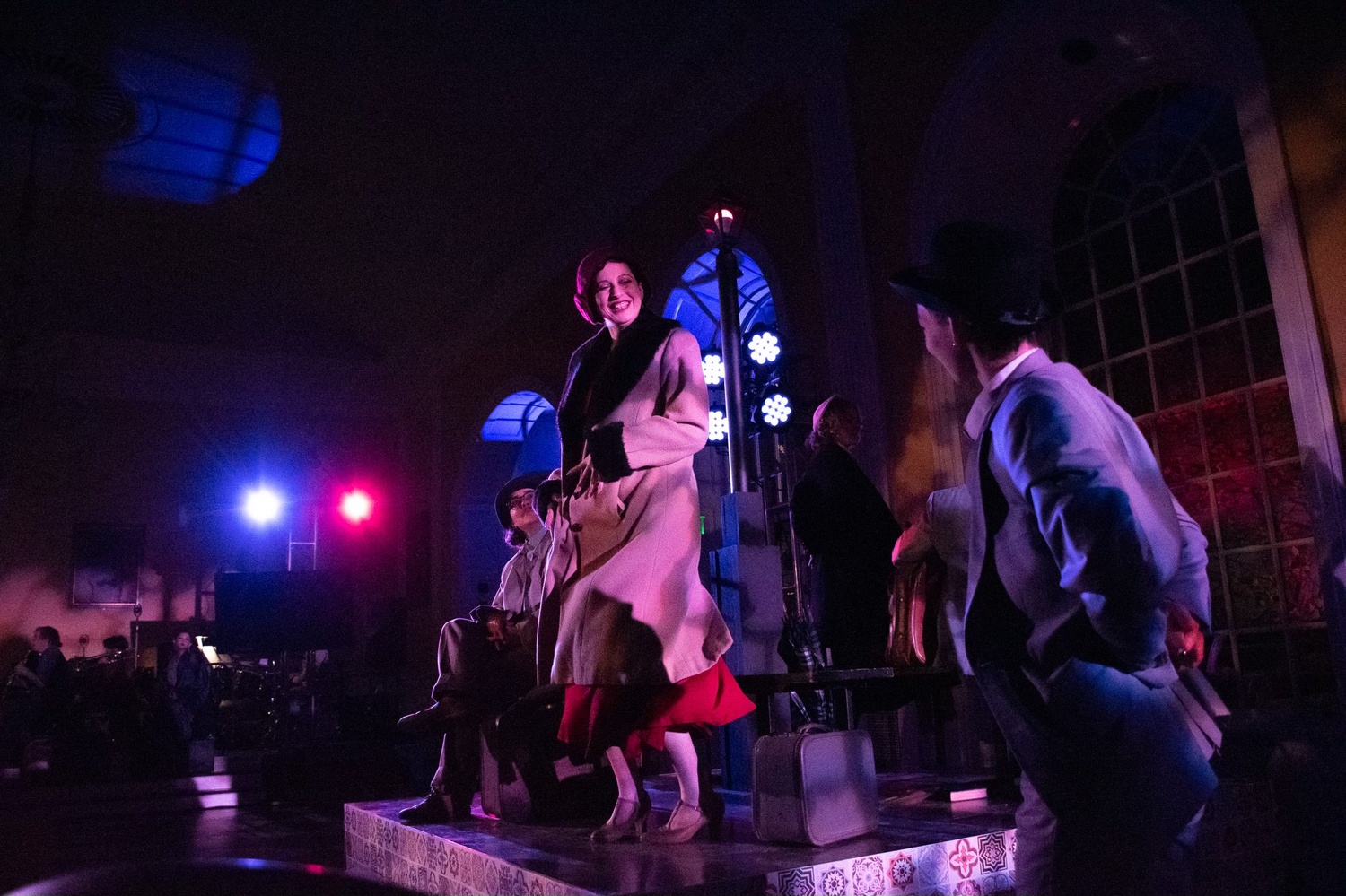
News
Nearly 200 Harvard Affiliates Rally on Widener Steps To Protest Arrest of Columbia Student

News
CPS Will Increase Staffing At Schools Receiving Kennedy-Longfellow Students

News
‘Feels Like Christmas’: Freshmen Revel in Annual Housing Day Festivities

News
Susan Wolf Delivers 2025 Mala Soloman Kamm Lecture in Ethics

News
Harvard Law School Students Pass Referendum Urging University To Divest From Israel
Lowell House Opera Returns to Historic Dining Hall With Avant-Garde ‘Postcard from Morocco’

From Feb. 21 to Feb. 23, Lowell House Opera returned to its historic venue, the Lowell House Dining Hall, with a three-performance run of Dominick Argento’s opera “Postcard from Morocco.” Directed by Haley M. Stark ’25 and music directed by Benjamin T. Rossen ’23, “Postcard from Morocco” is the 79th season production of the opera company, which is composed of Harvard undergraduates, Lowell affiliates, and Boston-based theater professionals.
“This is sort of our proof of concept year, demonstrating that it can happen,” Rossen said in an interview with The Crimson.
Lowell House Opera is the oldest currently performing opera company in New England, described by Stark as “full of tradition and ritual.” Due to House renovations, Covid-19, and administrative changes in Lowell House, the company has faced several venue changes and a show cancellation. “Postcard from Morocco” is its first full production in the dining hall since 2017.
“To go back to the dining hall is to go back to some of those traditions and rituals that we have foregone recently for various reasons,” Stark said.
The process of return has been incremental. “The Unknowable,” an original operatic ballet by Rossen, premiered at Sanders Theatre on Feb. 10, 2024. “Viva La Vie Bohème,” a concert featuring songs from the 1996 rock musical “Rent” and its loose inspiration, Pucicni’s 1896 opera “La Bohème,” ran in the Lowell House Dining Hall on April 12, 2024.
“After the success of ‘The Unknowable,’ it became clear that we could return back under the right conditions, and as long as we did it in a way that was more flexible in terms of the scope of the production,” Rossen said.
A strategic report assembled by Harvard’s Office for the Arts in 2023 identified arts programming in the Houses as one of “four distinct areas” needing greater investment, a plan Rossen says is deeply relevant to Lowell House Opera.
While pre-2017 productions featured elaborate sets built on the dais at the end of the dining hall, Stark’s team followed a stripped-down vision that was more sustainable yet remained artistically impactful, taking advantage of the dining hall’s grand windows and striking yellow walls. Placing the orchestra on the dais, the team built a makeshift stage in the center of the dining hall to immerse audiences in the show’s unconventional setting: a train station.
“I hope that this show offers [Lowell House Opera] an insight into what avant-garde staging can do for the modernization of some of these operas that might seem a little out of reach,” Stark said.
“Postcard from Morocco,” which premiered in 1971, is a far shot from the typical opera. A one-act show composed of narrative vignettes about seven characters waiting in a train station, it lacks a large chorus, symphonic orchestra, or even a narrative throughline. While abstract, the story reflects the human condition in its “very human” characters, according to Rossen.
“Some people seek connection. Some people keep to themselves and don’t want to talk to anyone. Some people invent their whole new personality just for that liminal space and when they leave it, they leave that behind as well,” said Chen Wine, a graduate student at the Longy School of Music of Bard College, who plays A Lady with a Hand Mirror.
The cast, which spans from professional performers to a first-year undergraduate, rehearsed nearly every night in the Lowell basement to prepare the show in a matter of weeks. Wine described the process as “intense, difficult, and joyous.” Upon moving to the dining hall, the Lowell House Opera team’s work coincided with resident student life.
“Sometimes we rehearsed with Lowell House students coming there, and drinking their drinks, doing their homework in the back,” Wine said.
The choice of a rather modern and unconventional opera fits with Lowell House Opera’s mission to prove impactful and accessible opera can exist in 2025, even in “intimate venues with strange configurations,” in Rossen’s words.
“I hope that people feel as though this venue is a legitimate one, and can absolutely house this kind of art making,” Rossen said. “We believe it has.”
“Postcard from Morocco” ran at Lowell House from Feb. 21 to Feb. 23.
—Staff writer Isabelle A. Lu can be reached at isabelle.lu@thecrimson.com. Follow her on X @IsabelleALu.
Want to keep up with breaking news? Subscribe to our email newsletter.
Most Read
- Harvard Suspends Research Partnership With Birzeit University in the West Bank
- 2 Years After Affirmative Action Ruling, Harvard Admits Class of 2029 Without Releasing Data
- Give the Land Up — Or Shut Up
- More Than 600 Harvard Faculty Urge Governing Boards To Resist Demands From Trump
- Harvard Students Don’t Need To Work Harder. Administrators Do.
